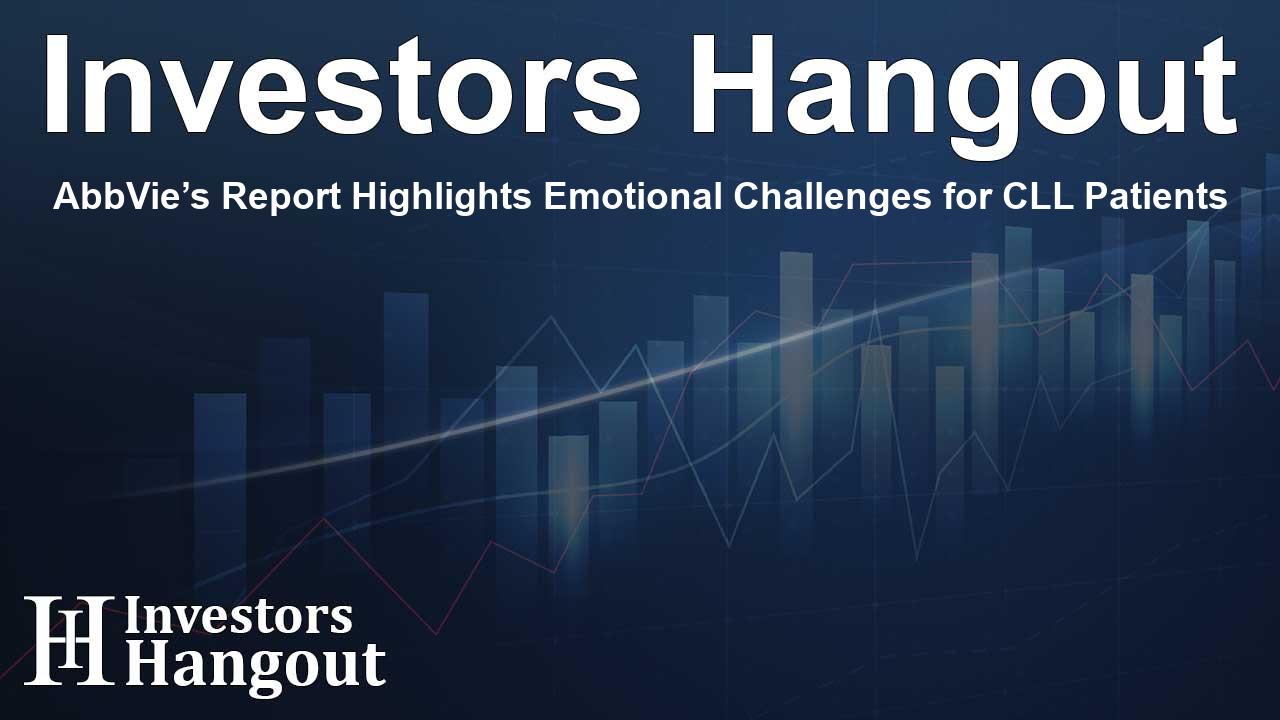AbbVie’s Report Highlights Emotional Challenges for CLL Patients

Understanding the Emotional Impact on CLL Patients
Recent findings reveal profound insights about the emotional struggles faced by patients with Chronic Lymphocytic Leukemia (CLL), particularly among underrepresented groups. According to an extensive survey conducted by AbbVie, Black, Hispanic, and Asian patients tend to experience more significant emotional challenges throughout their CLL diagnosis and treatment journey. As the number of individuals diagnosed with CLL continues to grow, it is crucial to understand these unique emotional perspectives.
Unique Emotional Experiences Reported
CLL is a prevalent form of leukemia that affects over 200,000 adults in the U.S. In the newly released Emotional Impact Report (EIR), AbbVie documented the mental health implications of CLL, with a particular focus on marginalized communities. The data collected illustrates that many patients from diverse backgrounds report heightened feelings of fear, uncertainty, and emotional distress when faced with their diagnosis, greatly influencing their overall well-being.
The Role of Ethnic Background in Emotional Health
Cultural perceptions significantly impact the healthcare experiences of patients with CLL. Many survey participants indicated a desire for emotional and educational support that aligns with their cultural beliefs. The statistics reveal a stark contrast: 45% of Asian, 38% of Hispanic, and 24% of Black respondents feel the need for culturally tailored resources, compared to a mere 2% of Caucasian participants.
Challenges Encountered Upon Diagnosis
Diagnosis brings numerous emotional challenges that can be overwhelming for patients. Fear and surprise were the most common reactions reported by both ethnically diverse patients and their Caucasian counterparts. Importantly, Hispanic patients voiced that they grappled with significant emotional burdens including a lack of clarity about future steps and concerns regarding financial implications from treatment options.
Communicating with Healthcare Professionals
The ability to communicate effectively with healthcare professionals is pivotal in managing not just the physical aspects of CLL, but also its emotional ramifications. However, the survey revealed that less than half of the participants felt adequately supported in expressing their emotional needs to their healthcare providers. This disconnect highlights the urgent need for a more robust support system for patients.
Moving Forward: Solutions and Collaboration
AbbVie is committed to addressing these emotional health challenges by collaborating with patient advocacy groups and healthcare professionals. The goal is to foster an environment where emotional well-being is prioritized within CLL care frameworks. By understanding the emotional complexities associated with CLL, AbbVie aims to ensure that every patient feels seen and supported, helping them navigate their journey with more resilience.
Engagement with Community and Advocacy Groups
Through continued advocacy and engagement with community representatives, AbbVie seeks to develop resources that cater directly to the needs of underrepresented CLL patients. By shining a light on these needs, they are taking significant steps towards improving the overall experience of CLL care.
The Path Towards Better Understanding
CLL is the most common type of leukemia among adults, presenting unique challenges that differ among demographic groups. The commitment to understanding these differences will hopefully lead to better-tailored therapeutic solutions that acknowledge the diverse experiences of patients. Continuous research and patient engagement are essential for enhancing the standard of care.
Frequently Asked Questions
1. What is Chronic Lymphocytic Leukemia (CLL)?
CLL is a type of cancer that originates in the bone marrow, affecting the production and function of lymphocytes, which are a type of white blood cell.
2. Why is the Emotional Impact Report important?
The Emotional Impact Report provides valuable insights into the emotional experiences of CLL patients, particularly from underrepresented groups, allowing for better support and resources tailored to their needs.
3. How can patients improve communication with their healthcare providers?
Patients should express their emotional needs openly during consultations and may benefit from preparing questions or discussing their concerns prior to appointments.
4. What cultural factors influence CLL patient experiences?
Cultural beliefs can significantly influence how patients perceive their diagnosis and engage with support resources, making culturally relevant education vital for effective care.
5. How does AbbVie plan to address emotional health in CLL?
AbbVie aims to collaborate with advocacy groups and develop actionable solutions that enhance the emotional support available to all CLL patients.
About The Author
Contact Ryan Hughes privately here. Or send an email with ATTN: Ryan Hughes as the subject to contact@investorshangout.com.
About Investors Hangout
Investors Hangout is a leading online stock forum for financial discussion and learning, offering a wide range of free tools and resources. It draws in traders of all levels, who exchange market knowledge, investigate trading tactics, and keep an eye on industry developments in real time. Featuring financial articles, stock message boards, quotes, charts, company profiles, and live news updates. Through cooperative learning and a wealth of informational resources, it helps users from novices creating their first portfolios to experts honing their techniques. Join Investors Hangout today: https://investorshangout.com/
The content of this article is based on factual, publicly available information and does not represent legal, financial, or investment advice. Investors Hangout does not offer financial advice, and the author is not a licensed financial advisor. Consult a qualified advisor before making any financial or investment decisions based on this article. This article should not be considered advice to purchase, sell, or hold any securities or other investments. If any of the material provided here is inaccurate, please contact us for corrections.
